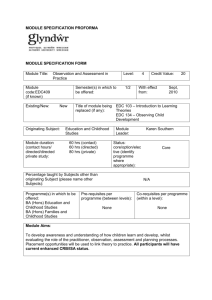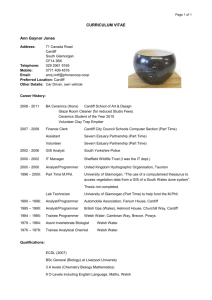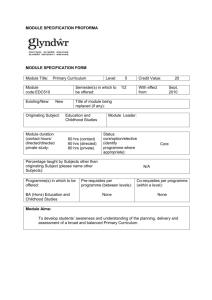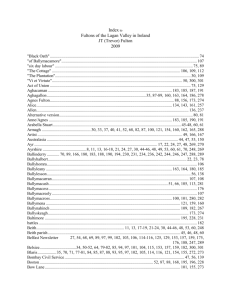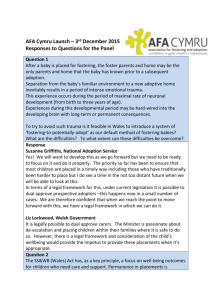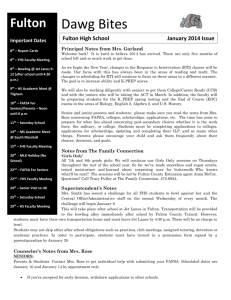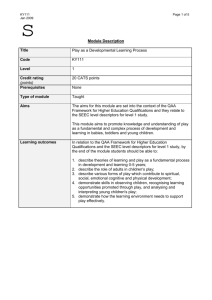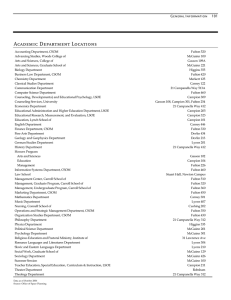EDC411
advertisement
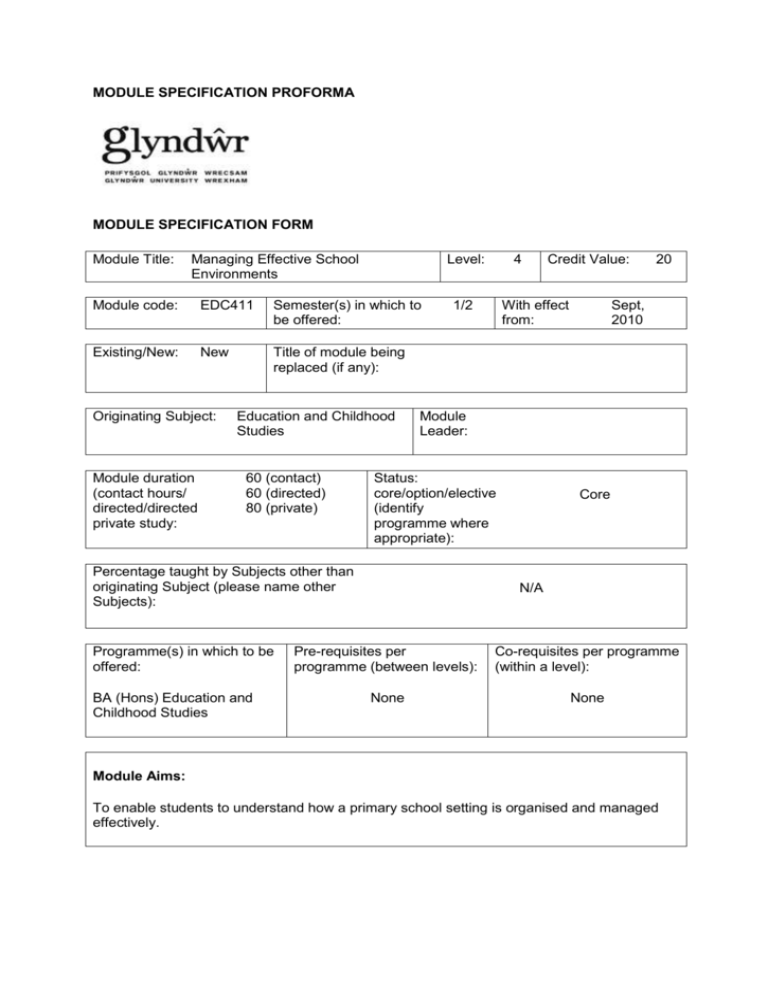
MODULE SPECIFICATION PROFORMA MODULE SPECIFICATION FORM Module Title: Managing Effective School Environments Level: Module code: EDC411 Semester(s) in which to be offered: Existing/New: New Title of module being replaced (if any): Originating Subject: Module duration (contact hours/ directed/directed private study: Education and Childhood Studies 60 (contact) 60 (directed) 80 (private) 1/2 BA (Hons) Education and Childhood Studies Credit Value: With effect from: 20 Sept, 2010 Module Leader: Status: core/option/elective (identify programme where appropriate): Percentage taught by Subjects other than originating Subject (please name other Subjects): Programme(s) in which to be offered: 4 Core N/A Pre-requisites per programme (between levels): Co-requisites per programme (within a level): None None Module Aims: To enable students to understand how a primary school setting is organised and managed effectively. Expected Learning Outcomes At the end of this module, students should be able to: Knowledge and Understanding: 1. Discuss how the environment can be designed, organised and managed to support learning and teaching; Identify the ways children/young people learn and systems to support those with learning differences; Highlight the qualities required to be a successful practitioner working with children, young people and families within a school setting; Explain the need for practitioners to develop partnerships with parents/carers and other agencies; Outline the key policies and documentation required in order to support practice; Evaluate and reflect upon working within a group, drawing together strategies for future personal and professional development. 2. 3. 4. 5. 6. Transferable/Key Skills and other attributes: Working with others. Communicating effectively, including listening attentively. Making decisions and problem solving. Working to a timeframe. Presenting information verbally and in writing. Evaluating and reflecting on their learning and group outcomes. Assessment: please indicate the type(s) of assessment (eg examination, oral, coursework, project) and the weighting of each (%). Details of indicative assessment tasks must be included. Students will work in groups to plan and present a school setting, focusing on policy, practice and provision within this environment. This will include a display, reflective log and presentation to a panel. Assessment 1 Learning Outcomes to be met All Type of assessment Group presentation and display, with reflective log. Weighting 100% Word count or equivalent if appropriate c4,000 (30-45 mins presentation) Learning and Teaching Strategies: This module will be presented through a programme of lectures and group tasks. Students will be given the opportunity to work collaboratively to design a setting and to structure the management of it. Syllabus outline: Students will initially explore their own perception of what constitutes quality in school settings, examining inspection documentation (e.g. aims/mission statement/ organisational ethos). The need to provide a quality learning and teaching environment, which takes into account children’s/young people’s social, emotional and physical development. Promoting an environment, indoor and outdoor, in which all those who access the provision (child/young person, parents/carers and other professionals) can be made to feel secure and confident within it, according to individual needs. The concept of a safe and secure environment (including: the role of risk assessment, with consideration given to beneficial risk; food and basic hygiene practicespreventing cross-infection). Examine theoretical, curricular and educational policy that influence practice (e.g. Foundation Phase/Stage; National Curriculum; the Special Needs Code of Practice; MacMilian/Montessori/ Piaget/Vygotsky/Froebel. Learning styles, multiple intelligences, thinking skills; teaching styles and group compositions. The importance of observation and how it informs plans to meet the needs of those within the setting. Students will examine the role of practitioners in particular their liaison with parents/ carers/families and other professionals. Students will be made aware that quality provision is the result of partnership across all agencies. The characteristics of an effective and caring practitioner will be highlighted, along with the need for individuals to engage in constructive team work. The need for the provision of inclusive practice whilst respecting the cultural and/or special needs of children/young people will also be addressed. Students will study what constitutes quality provision and will be introduced to the documentation and monitoring procedures that need to be in place (e.g. Ofsted, Estyn). Ways to develop and effectively manage policies within the setting (e.g. behaviour, health and safety, safe guarding children/young people, inclusion, sustainability). Bibliography Essential reading: Boyes, K. (2003), Creating an Effective Learning Environment. Australia: Hawker Brownlow Education. Department for Children, Education, Lifelong Learning and Skills (2008), Skills Framework for 3 to 19-year-olds in Wales. Cardiff: Welsh Assembly Government. Department for Children, Education, Lifelong Learning and Skills (2008), Learning and Teaching Pedagogy. Cardiff: Welsh Assembly Government. Department for Children, Education, Lifelong Learning and Skills (2008), Play/Active Learning. Overview for 3 to 7 year olds. Cardiff: Welsh Assembly Government. Department for Children, Education, Lifelong Learning and Skills (2008), Foundation Phase Child Development Profile Guidance. Cardiff: Welsh Assembly Government. English, E. and Newton, L. (2005), Professional Studies in the Primary School. Thinking Beyond the Standards. London: David Fulton Publishers. Other indicative reading: Arthur, J., Grainger, T and Wray, D. (eds) (2006), Learning to Teach in the Primary School. Oxon: Routledge. Asprey, E., Hamilton, C. and Haywood, S. (2002), Professional Issues in Primary Practice. Exeter: Learning Matters. Call, N. (2003), The Thinking Child. Brain –Based Learning for the Foundation Stage. Stafford: Network Educational Press Ltd. Cole, M. (2002), Professional Values and Practices for Teachers and Student Teachers. Second edition. London: David Fulton Publishers. Curtis, A. and O’ Hagan, M. (2003), Care and Education in Early Childhood. London: Routledge Falmer. Fisher, R (2003), Teaching Children to Think. London: Continuum. Hayes, D. (2000), The Handbook for Newly Qualified Teachers. Meeting the Standards in Primary and Middle Schools. London: David Fulton Publishers. Hayes, D. (2003), Planning, Teaching and Class Management in Primary Schools. Second Edition. London: David Fulton Publishers. Jacques, K. and Hyland, R. (2005), Professional Studies Primary Phase. Second Edition. Exeter: Learning Matters Jacques, K.and Hyland, R. (2007), Professional Studies Primary and Early Years. Third Edition. Exeter: Learning Matters. Knowles, G (ed) (2006), Supporting Inclusive Practice. London: David Fulton. Lee, C. (2007), Resolving Behaviour Problems in Your School. London: Paul Chapman Publishing. Medwell, J. (2007), Successful Teaching Placement. Primary and Early Years. Second Edition. Exeter: Learning Matters. Meggitt, C. (2006), Child Development. An Illustrated Guide. Second Edition. Essex: Heinemann. Overall, L. and Sangster, M. (2003), Primary Teacher’s Handbook. London: Continuum. Pollard. A, (2002), Reflective Teaching. London: Continuum. Rogers, B. (2000), Cracking the Hard Class: Strategies for Managing the Harder than Average Class. London. Paul Chapman. Rogers, B. (2002), Teacher Leadership and Behaviour Management. London. Paul Chapman. Rogers, B. (2006), Classroom Behaviour. London. Paul Chapman. Spooner, W. (2006), The SEN Handbook for Trainee Teachers, NQTs and Teaching Assistants. London: David Fulton. Yeomans, J. and Arnold, C. (2006), Teaching, Learning and Psychology. London: David Fulton. Useful web-sites: http://estyn.gov.uk/publications/. http://www.dfes.gov.uk/teachingreforms/leadership/mcber/ http://www.ofsted.gov.uk/reports www.alite.co.uk www.standards.dfes.gov.uk - Look for Personalised Learning. www.wales.gov.uk
